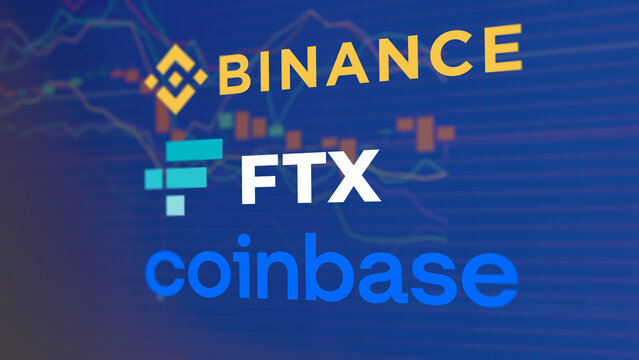Just a few years ago, cryptocurrency was hailed as the future of finance. FTX, Binance, and Coinbase were the biggest names, each leading the way in digital trading. They promised to make crypto mainstream and change the financial world. However, even the biggest names weren’t immune to collapse or controversy in an industry prone to wild volatility, scandal, and regulatory scrutiny,
This article delves into how FTX, Binance, and Coinbase rose to prominence, what led to their setbacks, and what the future holds for crypto exchanges.
The Rise – How These Exchanges Became Crypto Powerhouses
FTX started in 2019 by Sam Bankman-Fried (SBF). It quickly became a dominant player in crypto trading because of its aggressive marketing, big sponsorship deals, and easy trading options. Investors like SoftBank, Sequoia Capital, and BlackRock poured in money, pushing its value to $32 billion by 2022. SBF became a key figure in crypto, promoting regulations and charity work while turning FTX into a global giant. (Seven Pillars).
Binance was created in 2017 by Changpeng Zhao (CZ). It grew at a crazy speed, becoming the biggest crypto exchange in the world. Unlike Coinbase, Binance didn’t follow strict U.S. rules, so it let people trade more cryptocurrencies with lower fees. By 2021, it was handling trillions in trades every year, staying ahead with new tokens and innovations like Binance Smart Chain (BSC) (CoinDesk).
Coinbase was launched in 2012, founded by Brian Armstrong. It was different from Binance because it focused on following regulations. In 2021, it became the first crypto exchange to go public on NASDAQ, a huge step in making crypto mainstream. Coinbase’s user-friendly interface, regulatory approval, and partnerships with payment providers helped it gain millions of users. At its peak, it held over $256 billion in assets (Wikipedia).
The Fall – Scandals, Lawsuits, and Crashes
FTX’s downfall was swift and catastrophic. In November 2022, reports surfaced that FTX had been using customer funds to prop up its sister company, Alameda Research. When Binance announced plans to sell its holdings of FTX’s native token (FTT), panic ensued, leading to a bank run on FTX. Within days, FTX declared bankruptcy, and Sam Bankman-Fried was arrested and later convicted of fraud. Over $8 billion in customer funds were unaccounted for (The New York Times). The scandal not only shook investors but also triggered global regulatory crackdowns.
Despite Binance’s success, it faced increasing scrutiny from U.S. and global regulators. In 2023, the U.S. Department of Justice charged Binance with money laundering violations, forcing CZ to step down as CEO and pay a $4.3 billion settlement. Binance’s regulatory troubles raised concerns about centralized exchanges’ transparency and how they handle customer funds (Reuters). While Binance remains operational, its dominance has been shaken.
Unlike FTX and Binance, Coinbase was not accused of fraud, but it faced its own battle with the Securities and Exchange Commission (SEC). The SEC sued Coinbase in 2023, arguing that it was offering unregistered securities. Coinbase’s stock price plummeted, and its efforts to push for clearer crypto regulations became a key part of the industry’s fight for legitimacy. Despite challenges, it remains the largest U.S.-regulated exchange (Bloomberg).
The Aftermath – Where Are They Now?
FTX – Collapsed and Rebranded
FTX filed for bankruptcy in November 2022, leaving billions in losses. FTX’s bankruptcy process continues as new management attempts to recover lost funds and settle with creditors. The idea of relaunching FTX under a new name has been floated, but investor and public confidence remains severely damaged. Meanwhile, Sam Bankman-Fried was convicted of fraud, and legal battles continue, with multiple lawsuits from regulators and former investors still in play.
Binance – Still Operational but Weakened
Although Binance remains the largest crypto exchange, the departure of CZ and the massive settlement with U.S. authorities have forced the company to adjust its operations. Binance has been scaling back in multiple regions, shutting down services in countries with stricter regulations. Binance has increased compliance efforts to restore trust, hiring regulatory experts and former government officials to ensure better oversight.
Coinbase – Struggling But Surviving
Coinbase, despite facing regulatory headwinds, has been actively lobbying for clearer crypto regulations. The company has been expanding institutional trading services to attract major financial firms. While its stock has seen significant volatility, Coinbase remains the most compliant and transparent exchange in the U.S.
Lessons from the Crypto Meltdown
The saga of FTX, Binance, and Coinbase reveals key lessons for investors and regulators:
- Transparency is critical – FTX’s downfall highlighted the dangers of opaque financial dealings. Proper risk management and independent audits should be industry standards to prevent future collapses.
- Regulation is inevitable – Governments worldwide are increasing scrutiny on crypto exchanges. Clearer regulations can provide investor protection while ensuring fair market practices.
- Security and compliance must evolve – Binance’s legal troubles and Coinbase’s SEC battle show that compliance with evolving financial laws is essential for survival in the industry.
- Decentralization may be the future – As trust in centralized exchanges diminishes, decentralized finance (DeFi) platforms and decentralized exchanges (DEXs) are gaining popularity as more secure alternatives.
- User awareness is crucial – Investors must be cautious and conduct thorough research before trusting any exchange with their assets. Self-custody solutions, such as hardware wallets, are becoming more popular as users prioritize security.
Crypto has had its ups and downs, but it’s still changing and growing. Rules, new technology, and people’s trust will decide what happens next. The big question is: Can crypto exchanges make a comeback, or will decentralized systems take over?














